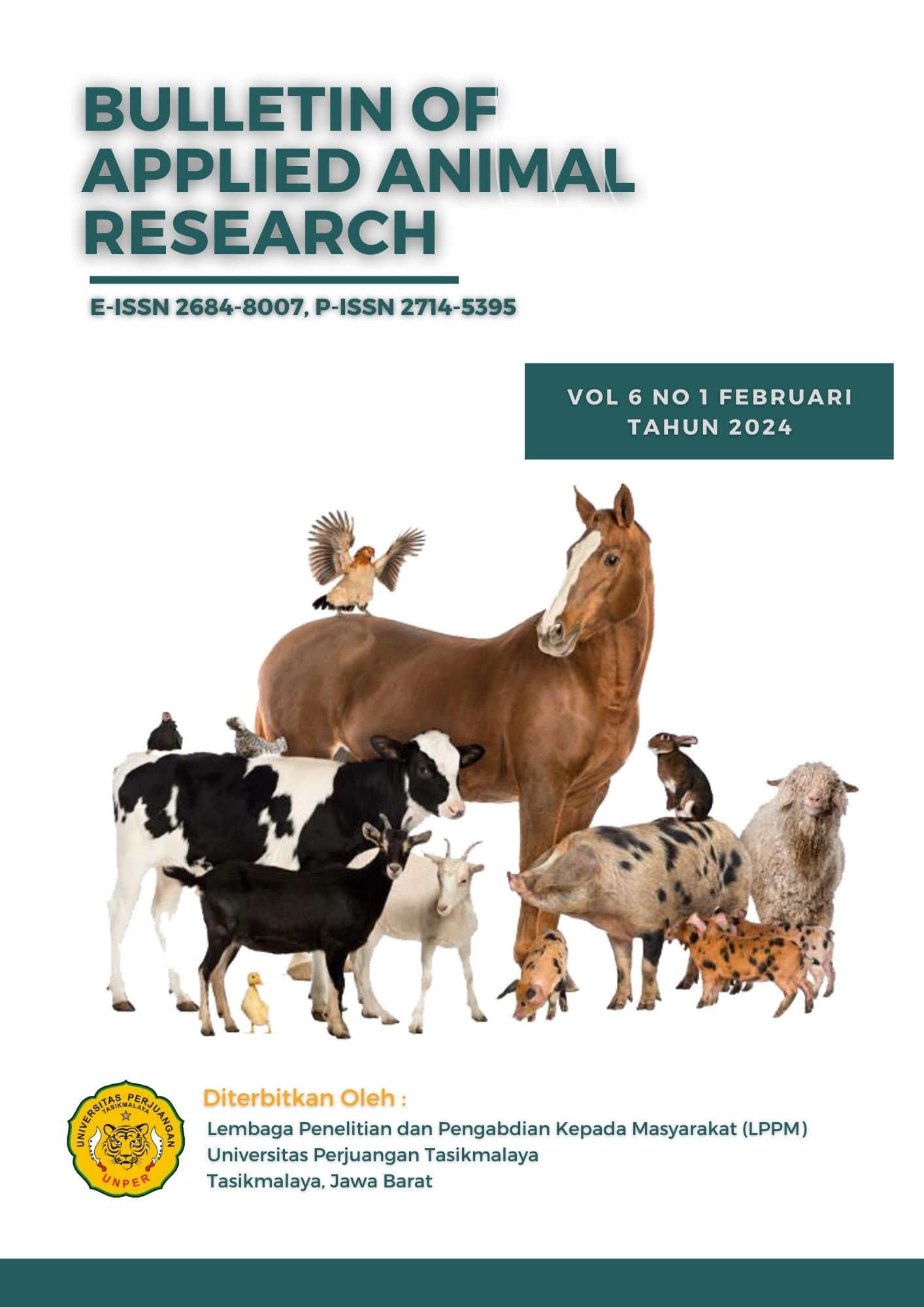The effect of initial body weight on daily gain and feed efficiency of fattening local lambs
DOI:
https://doi.org/10.36423/baar.v6i1.1537Abstract
Research on the Effect of Initial Weight on Daily Weight Gain, Feed Consumption and Feed Efficiency of Local Fattening Sheep was carried out from March to June 2023 at Santika Farm located in Cilembu Village, Sumedang Regency. The aim of this research is to determine whether there is a correlation between initial body weight and daily body weight gain, feed consumption and feed efficiency, and to determine the optimal average range of body weight that produces the best daily body weight gain and feed efficiency. The research method used was an experimental approach based on a Completely Randomized Design (CRD) with three treatments and six replications. Data were analyzed using Analysis of Variance (Anova) followed by Duncan's Multiple Range Test to determine the real difference in daily body weight gain, while feed efficiency did not show a real difference so no further testing was carried out. The average daily weight gain at an initial body weight of 27-30 kilograms (P3) is 157 grams, 23-26 kilograms (P2) is 133 grams, and 18-22 kilograms is 130 grams. Feed DM consumption for sheep with an initial weight of 18-22 kilograms (P1), 23-26 kilograms (P2) and 27-30 kilograms (P3) is 5.51, 6.48, 7.13 DM/kilogram/day. Feed efficiency at an initial weight of 18-22 kilograms (P1) was 15.3%, 27-30 kilograms (P3) was 13.2%, and 23-26 kilograms (P3) was 12.1%. The conclusion of this study is that an initial body weight of 27-30 kilograms has the best daily gain.
References
Badan Pusat Statistik. 2022. Populasi Domba menurut Provinsi (ekor), 2020-2022. [Online]. Direktorat Jenderal Peternakan dan Kesehatan Hewan, Kementan. Indonesia. https://www.bps.go.id/indicator/24/473/1/populasi-domba-menurut-provinsi.html, diakses 14 Maret 2023.
Kearl, L. C. 1982. Nutrient Requirements of Ruminants in Developing Countries. Internasional Feedstuffs Institute Utah Agricultural Experiment Stasion Utah State University Logan Utah, Utah. 55.
Mathius, I. W., Martawidjaja M., Wilson A., dan Manurung T. 1996. Studi Strategi Kebutuhan Energi dan Protein untuk Domba Lokal Fase Pertumbuhan. Jurnal Ilmu Ternak dan Veteriner. 2(2):84-91.
Natasasmita, A. 1978. Body Composition of Swamp Buffalo (Bubalus Bubalis) Astudy of Development University of Meulborne. Dalam: Romadhoni, W. 2014. Pengaruh Bobot Badan Awal Terhadap Efisiensi Pakan pada Penggemukan Sapi Lokal Persilangan (Studi Kasus di Teaching Farm Fakultas Peternakan-Unpad. E- Journals, Sumedang. 3:3.
Papi, N. 2016. Effect of Initial Weight on Growth Performance, Intake and Feed Efficiency of Chall Mail Lambs. Applied Animal Science Research Journal. 31-38.
Pond, W. G., D. C. Chruch., and K. R. Pond,. 1995. Basic Animal Nutritions and Feeding Four Edition. John Willey and Sons, USA. 375-376.
Pond, W. G., D. C. Chruch., K. R. Pond,. and P. A. Schoknecht. 2005. Basic Animal Nutrition and Feeding Fifith Edition. John Willey and Sons, inc., New York. 608.
Prawoto, J. A., C. M. S. Lestari, dan E. Purbowati. 2001. Keragaan dan Kinerja Produksi Domba Lokal Jantan yang dipelihara Intensif dengan Memanfaatkan Ampas Tahu sebagai Pakan Campuran. Lembaga Penelitian Universitas Diponegoro, Semarang.
Ranjhan, S. K. 1980. Animal Nutrition and Feeding Practice in India. Vikas Publishing House PVT Ltd., New Delhi. 350.
Sayili, M., M. Cimen, and M. Karaalp. 2009. The Effects of Different Initial Live Weights and Sex on the Fattening Performance and Economic Analysis of Fat-Tailed Lambs in Pasture Feeding in Turkey. Bulgarian Journal of Agricultural Science. 15 (No 5):435-440.
Sidauruk, R., L. Cyrilla, and J. Atmakusuma. 2002. Analisis Efisisensi Pola Usaha Sapi Potong di Bekasi Jawa Barat. Journal of Animal Science and Technology. 24 (1):133.
Tanuwiria, U. H. 2013. Efek Suplementasi Kompleks Mineral Minyak dan Mineral Organik dalam Ransum Terhadap Kecernaan Ransum, Populasi Mikroba Rumen dan Performa Produksi
Domba
Jantan. Seminar Nasional dan Kongres Asosiasi Ahli Nutrisi dan Pakan Ternak. Fakultas Peternakan Universitas Gadjah Mada, Yogyakarta. 327-334.
Tillman, A. D., H. Hartadi, S. Reksohadiprodjo, S. Prawirokusumo, dan S. Lebdosoekojo. 1984. Ilmu Makanan Ternak Dasar. Gadjah Mada University Press, Yogyakarta. 422.
Downloads
Published
How to Cite
Issue
Section
License
Copyright (c) 2024 An An Nurmeidiansyah, Dzikri Almatlubi, Ken Ratu Gharizah Alhuur, Ronnie Permana

This work is licensed under a Creative Commons Attribution-ShareAlike 4.0 International License.












